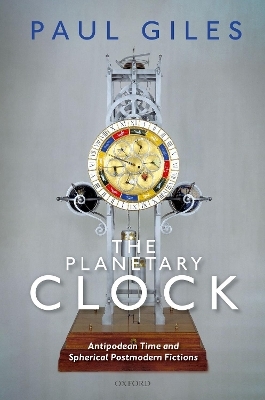
The Planetary Clock
Oxford University Press (Verlag)
978-0-19-885772-3 (ISBN)
The theme of The Planetary Clock is the representation of time in postmodern culture and the way temporality as a global phenomenon manifests itself differently across an antipodean axis. To trace postmodernism in an expansive spatial and temporal arc, from its formal experimentation in the 1960s to environmental concerns in the twenty-first century, is to describe a richer and more complex version of this cultural phenomenon. Exploring different scales of time from a Southern Hemisphere perspective, with a special emphasis on issues of Indigeneity and the Anthropocene, The Planetary Clock offers a wide-ranging, revisionist account of postmodernism, reinterpreting literature, film, music, and visual art of the post-1960 period within a planetary framework.
By bringing the culture of Australia and New Zealand into dialogue with other Western narratives, it suggests how an antipodean impulse, involving the transposition of the world into different spatial and temporal dimensions, has long been an integral (if generally occluded) aspect of postmodernism. Taking its title from a Florentine clock designed in 1510 to measure worldly time alongside the rotation of the planets, The Planetary Clock ranges across well-known American postmodernists (John Barth, Toni Morrison) to more recent science fiction writers (Octavia Butler, Richard Powers), while bringing the US tradition into juxtaposition with both its English (Philip Larkin, Ian McEwan) and Australian (Les Murray, Alexis Wright) counterparts. By aligning cultural postmodernism with music (Messiaen, Ligeti, Birtwistle), the visual arts (Hockney, Blackman, Fiona Hall), and cinema (Rohmer, Haneke, Tarantino), this volume enlarges our understanding of global postmodernism for the twenty-first century.
Paul Giles is Challis Professor of English at the University of Sydney. He has worked at the Universities of Nottingham, Cambridge, Oxford, and Portland State and he is currently serving as President of the International Association of University Professors of English.
Introduction: Antipodean Time and the Anthropocenic Imaginary
1: Répétition Planétaire: Upside Down Postmodernism
2: Antipodean Alice: Cold War Fetishism and Frozen Time
3: Queer Poetic Time: Crosstemporal Parataxis and Disjunctions of Scale
4: "Reverse-Thinking": Metahistorical Arts and Fictions
5: Two-way Time Travel: Recursive Science and "Backward-Flowing" Fiction
6: Postmodern Slave Narratives: Anachronism and Disorientation
7: Reorchestrating the Past: Long Songs and Antipodean Relations
Conclusion: The Long Postmodernism
| Erscheinungsdatum | 12.04.2021 |
|---|---|
| Zusatzinfo | 22 colour and 16 black and white Illustrations |
| Verlagsort | Oxford |
| Sprache | englisch |
| Maße | 164 x 26 mm |
| Gewicht | 882 g |
| Themenwelt | Kunst / Musik / Theater ► Kunstgeschichte / Kunststile |
| Geisteswissenschaften ► Sprach- / Literaturwissenschaft ► Anglistik / Amerikanistik | |
| Geisteswissenschaften ► Sprach- / Literaturwissenschaft ► Literaturwissenschaft | |
| ISBN-10 | 0-19-885772-1 / 0198857721 |
| ISBN-13 | 978-0-19-885772-3 / 9780198857723 |
| Zustand | Neuware |
| Informationen gemäß Produktsicherheitsverordnung (GPSR) | |
| Haben Sie eine Frage zum Produkt? |
aus dem Bereich


